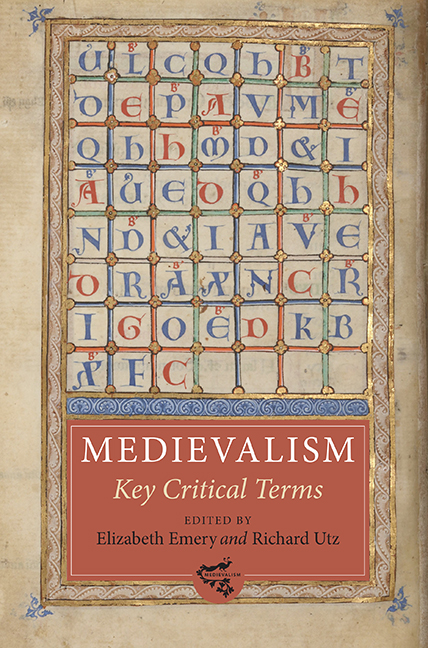Book contents
- Frontmatter
- Dedication
- Contents
- List of Illustrations
- List of Contributors
- Making Medievalism: A Critical Overview
- 1 Archive
- 2 Authenticity
- 3 Authority
- 4 Christianity
- 5 Co-disciplinarity
- 6 Continuity
- 7 Feast
- 8 Genealogy
- 9 Gesture
- 10 Gothic
- 11 Heresy
- 12 Humor
- 13 Lingua
- 14 Love
- 15 Memory
- 16 Middle
- 17 Modernity
- 18 Monument
- 19 Myth
- 20 Play
- 21 Presentism
- 22 Primitive
- 23 Purity
- 24 Reenactment
- 25 Resonance
- 26 Simulacrum
- 27 Spectacle
- 28 Transfer
- 29 Trauma
- 30 Troubadour
- Index
- Medievalism
29 - Trauma
Published online by Cambridge University Press: 08 October 2022
- Frontmatter
- Dedication
- Contents
- List of Illustrations
- List of Contributors
- Making Medievalism: A Critical Overview
- 1 Archive
- 2 Authenticity
- 3 Authority
- 4 Christianity
- 5 Co-disciplinarity
- 6 Continuity
- 7 Feast
- 8 Genealogy
- 9 Gesture
- 10 Gothic
- 11 Heresy
- 12 Humor
- 13 Lingua
- 14 Love
- 15 Memory
- 16 Middle
- 17 Modernity
- 18 Monument
- 19 Myth
- 20 Play
- 21 Presentism
- 22 Primitive
- 23 Purity
- 24 Reenactment
- 25 Resonance
- 26 Simulacrum
- 27 Spectacle
- 28 Transfer
- 29 Trauma
- 30 Troubadour
- Index
- Medievalism
Summary
WHEN SIGMUND FREUD famously took up the question of trauma in Beyond the Pleasure Principle (1920) and asked why individuals unconsciously repeat patterns of suffering in their lives, he exemplified such traumatic repetition with a scene drawn from Torquato Tasso's epic of the First Crusade, Gerusalemme Liberata (1581), penned by the poet in the triumphant wake of a Christian victory over the Ottoman navy at the Battle of Lepanto (1571). Tasso used the matter of pagan epic as an imperial mirror and repetitiously sought to annex to his imaginary Christian Jerusalem (translatio imperii) things Trojan (the matter of Homer's Iliad), and things Roman (the matter of Virgil's Aeneid). Freud, too, thought epically. He conceived his Interpretation of Dreams as an epic: “[it] becomes in effect, Freud's Aeneid because of its recurrent focus on ‘the matter of Rome.’” Freud was also intent on the matter of Troy as explicated by his hero Heinrich Schliemann, the excavator of Troy, whose archaeological account, Ilios: The City and the Country of the Trojans, first appeared in German in 1881. The utter confusion of Turks and Trojans, whose entangled genealogy dates to the medieval period, and which was revived contentiously in Renaissance histories of the Ottoman Turks, traumatically haunts Freud's matter of Rome in The Interpretation of Dreams, and, I shall argue, haunted Tasso's epic as well. Both are medieval- isms that mobilize the tropes of massacre and martyrdom that fueled Christian accounts of the overthrow of Muslim rule in Jerusalem in 1099.
Epic and psychoanalysis are closely bound; yet, students of Freudian trauma have reflected more on the traumas of medievalism than on the medievalisms of Freud's theory of trauma. They have not questioned the entanglement of translatio imperii with the unconscious of psychoanalysis. This essay addresses the medievalism of Freud's trauma in an effort to gain insight into what happens when the trauma of translatio imperii is foreclosed in the very theory of psychoanalytic trauma.
Freud drafted his dream book in the wake of several excursions in the Balkans. Under Ottoman hegemony since 1463, the western edges of this geopolitical region had only come under Austro-Hungarian rule with the Treaty of Berlin in 1878. Freud collected a series of anecdotes about his Balkan journey in an essay published under the title “Psychic Mechanisms of Forgetfulness” (1898).
- Type
- Chapter
- Information
- Medievalism: Key Critical Terms , pp. 247 - 254Publisher: Boydell & BrewerPrint publication year: 2014



